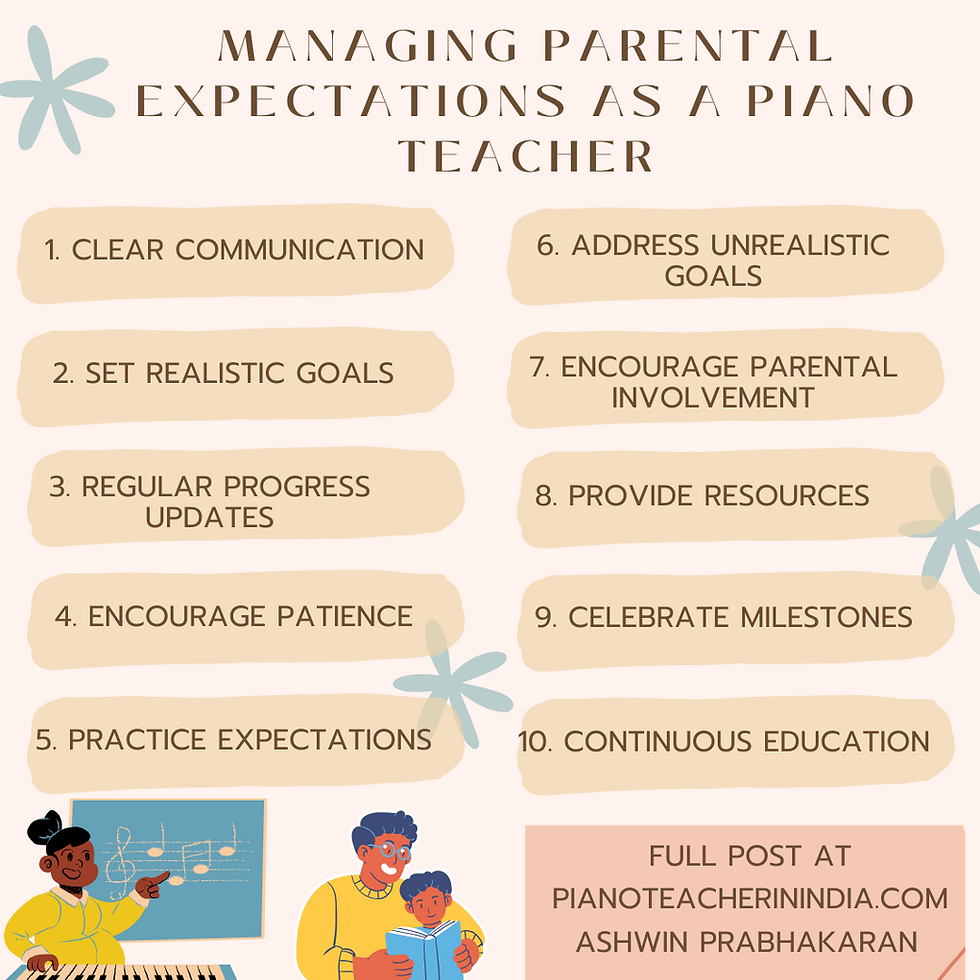Managing Parental Expectation as a Piano Teacher
- Sep 11, 2023
- 3 min read

Here is a Secret to a successful Piano Teaching Experience - FOCUS ON THE PARENT!!!
Managing parental expectations as a piano teacher perhaps the most crucial link for creating a positive, productive and long-term learning environment for your student.
Here are a few thoughts to help navigate this aspect of the Piano Teaching Profession effectively:
1. Clear Communication: From the very beginning, communicate your teaching philosophy, goals, and expectations to parents. Be honest about what you can offer and what they can expect from you as a piano teacher. Make sure they understand the commitment required from both the student and the parent.
It is important at the beginning of each Year/Level, that the teacher takes the time to explain and counsel the parent regarding the skills Achieved, the Roadmap ahead, the differences between the Previous and the New Year/Level, the challenges, discipline and commitment required.
2. Set Realistic Goals: Work with the parents to set realistic and achievable goals for their child's piano education. Parents need to be counselled and made to understand that each student progresses at their own pace, and not all students will become concert pianists. Emphasize the importance of the learning process and enjoyment of music.
Often, parents are not able to visualize the amount of work it takes to learn the piano, especially while managing the demands of the Indian Education System. Students are burdened with way too many activities and extra-curricular that
3. Regular Progress Updates: Keep parents informed about their child's progress through regular updates, either through written reports or face-to-face meetings. Share both the achievements and challenges the student is facing and provide constructive feedback on how parents can support their child's learning at home.
Ideally have a combination of both Verbal and Written Communication so that there is a continuous feedback to parents, and that there is a paper trail for the same!!
4. Encourage Patience: Help parents understand that learning the piano is a long-term endeavor. Progress may be slow at times, and there will be periods of frustration. Encourage parents to be patient and supportive during these times.
The teacher must really proactively and continually work on this with the parent!!
5. Practice Expectations: Clearly outline the practice expectations for students. Provide guidance on how parents can create a conducive practice environment at home. Emphasize the importance of consistent daily practice, but also make it clear that quality practice is more important than quantity.
This also is something that parents need constant counseling on.
6. Address Unrealistic Goals: If parents have unrealistic expectations for their child's progress, have an open and honest conversation with them. Explain the factors that influence progress, such as practice time, natural talent, and the student's dedication. Encourage them to focus on the joy of music rather than solely on achieving specific milestones.
I see parents get into an unrealistic frenzy of wanting to finish UK Exams Grade 8 by the time their child reaches 10th/12th Standard in Academics. Now, this is a very unrealistic Goal for majority of students for various reasons - the academic demands in High School in India is extremely high for students to also manage the extremely high volume of work required to be done in Advanced Grades (6-8) unless they are either super passionate about Classical Music and are extremely independent, disciplined, meticulous and organized workers!!
7. Encourage Parental Involvement: Encourage parents to be actively involved in their child's musical journey. Attend recitals and performances together, and foster a sense of community among your students and their families.
School going students of any age need Parental support in terms of attention and time, and this extends even to their Piano Learning. When a child feels supported and attended to by the parent, they are most likely to put in the work required. And a Piano Teacher must counsel the parent on this point regularly!!!
8. Provide Resources: Offer resources to parents, such as recommended books, online tutorials, and practice apps, to help them support their child's learning outside of lessons.
Teacher should suggest and suggest to the parents the activities they can do to help their students outside of lessons and practice such as those mentioned above and also to attend concerts
9. Celebrate Milestones: Celebrate students' achievements and milestones, no matter how small. This can include certificates, small awards, or informal recitals. This positive reinforcement can motivate both the student and their parents.
10. Continuous Education: Encourage parents to continue their own education about music and piano learning. The more they understand about the process, the more they can support their child effectively!!!
Building a positive and collaborative relationship with parents is key to successful piano teaching. By managing their expectations and keeping communication channels open, you can create an environment that fosters a love for music and helps students reach their full potential.


.jpeg)
Comments